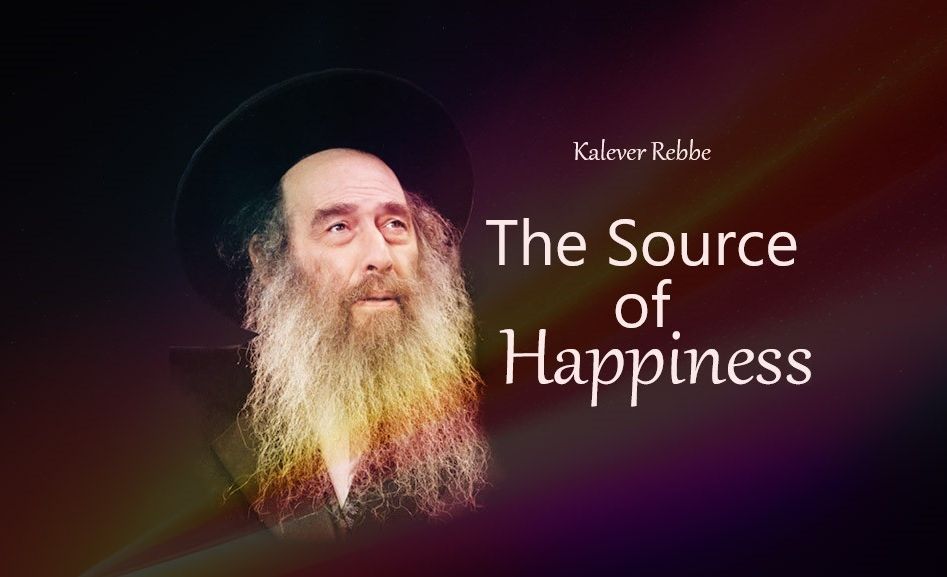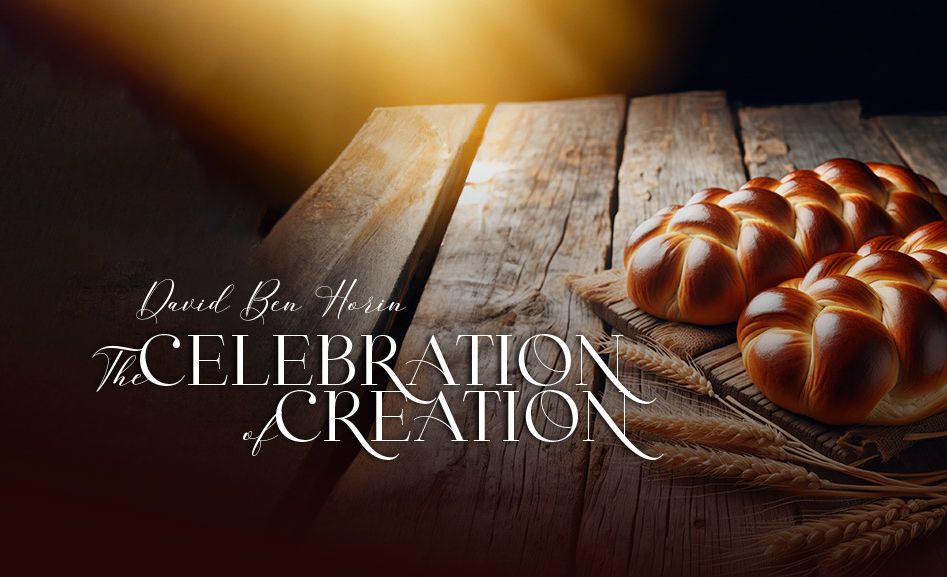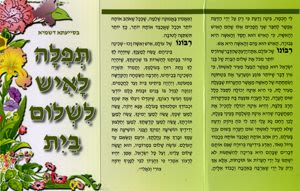
An Effective Pain Killer
Get ready for Shabbat - The King of Kings is one of your guests! The Kalever Rebbe explains how important joy and singing Shabbat songs are in sweetening judgments.

“And it shall be, on the seventh day, that he shall shave off all his hair“. (Vayikra 4:9)
The Reward for Joy
There is a distinct emphasis to rejoice on Shabbat. As we sing in the zemirot (songs), “On Shabbat, be happy and rejoice.” Similarly, we say during Shabbat davening (prayer): “They will rejoice in Your kingdom – those who preserve Shabbat.”
There is a unique reward for those who enjoy experiencing Shabbat, as Chazal taught (Shabbat 118a): “Anyone who rejoices on Shabbat receives a boundless portion”.
Throughout the generations, we have seen the transformative impact of simcha (happiness) on Shabbat. As the Jerusalem Maggid, R’ Yitzchak Parchi wrote in Motik Midevash (Chapter 6): “With our own eyes we have seen countless times a tragedy or stressful challenge happen in one’s life on Erev Shabbat. However, when they welcome Shabbat with simcha and joy, that sorrow and worry is removed from their lives; the pain is transformed into simcha, and the darkness into light”.
Simcha in Every Situation
The daughter of R’ Tzvi Hirsch from Riminov once fell ill on a Friday. Everyone was concerned about her condition. However, once Shabbat arrived, the Riminover Rebbe went to shul and passionately and jubilantly sang the Shabbat tefillot (prayers). He danced during Lecha Dodi with a joy that was incredible, just as the Rebbe did weekly. During the meals, he was joyous and everyone around him felt the simcha. There wasn’t even a semblance of concern for his daughter’s health.
During the meal, those close to him cried out asking the Rebbe to seek mercy for his daughter from the Heavens. The Rebbe replied, ” The pasuk says, ‘I entreated the Lord at that time, saying … ( Devarim 3:23)’ Moshe was davening for those who are in times of sorrow to have the ability to “say”. Meaning, Moshe wanted the Jews for all time to find the faith and trust in Hashem that will enable them to remain steadfast in their love, to empower them to daven, and to speak to Hashem even during the most difficult times. Their sorrow should never diminish their love for Hashem.”
Then the Rebbe added a prayer, “Hashem, every soul is in Your hands! What does it matter if you delay taking my daughter’s soul back until after Shabbat so that the pain would not deprive me of simcha on Shabbat!”
The Rebbe continued the meal with the same intense joy. His request was answered, and his daughter lived.
The Root of the Alesk Dynasty
The community in Belz had decided to find a new Av Beit Din. They drafted a letter of termination for the current Rav and asked the secretary to deliver it to him on Friday. However, the assistant, not wanting to impact the Rav’s Shabbat decided to wait. When he finally delivered the letter to the Rav, he explained that he delayed until after Shabbat.
The Rav gratefully asked, “Please tell me, what can I bless you with?”
The assistant replied, “My wife and I are childless. Would the Rav please bless us for children?”
The Rav happily obliged and said, “Since you protected my simcha on Shabbat, you will give birth to an exceptional child.”
The following year, the couple had a son, R’ Yitzchak, who would grow up to be a tremendous Torah scholar and the Av Beis Din in Belz and whose righteous descendants became the leaders of the holy dynasty of Alesk.
The Root of Koznitz
There was once a Jew named R’ Shabbatai who was a bookbinder by trade. He was barely able to support his family, and they lived in poverty. One Shabbat, they had nothing in the house to eat except beans. So, his wife prepared the beans for their family’s Shabbat meal.
When the time came for the fish, the wife served beans. And, after eating the beans, R’ Shabbatai began joyously dancing in honor of Shabbat. Now it was time for the soup. The wife served more beans. Again, after eating the beans the husband started dancing. Beans were served instead of meat and, yet again, R’ Shabbatai got up and danced a third time.
At the same time, the Baal Shem Tov was sitting in his home and with his prophetic vision he saw what R’ Shabbatai was doing. Each time the Baal Shem Tov saw R’ Shabbatai dancing, he laughed.
After Shabbat, the Baal Shem Tov explained to his students why he had laughed three times. They all travelled to the home of R’ Shabbatai, and the Baal Shem Tov told him, “The simcha that you expressed during Shabbat, despite having very little, brought tremendous nachas (gratification) to Hashem. In the merit of that simcha, Hashem is going to entrust you with an incredibly holy son.” The following year a son was born who would become my holy ancestor the Koznitzer Maggid.
The Reward from the King
In Taharos HaKodesh, an analogy is offered to explain this concept:
There was a king who sent a message to one of his subjects informing him that the king was coming for a visit. Naturally, the subject is overwhelmed with joy. The preparations are burdensome, but the subject is excited. When the day finally comes for the king’s visit, the king clearly sees how much joy, care, and excitement his visit roused in this subject. As a result, he provides his subject with many gifts to show his appreciation. On the other hand, if the subject looks worried and burdened, the king responds accordingly.
So too, on Shabbat, the King of Kings visits the home of every Jew. If the Jew seems joyous, if he sings and dances, if his prayers are filled with excitement, then Hashem provides him with limitless blessings.
This idea is alluded to in the pasuk, “And it shall be, on the seventh day, that he shall shave off all his hair”. (Vayikra 4:9)
The Hebrew word והיה (“And it shall be”) denotes simcha, and “on the seventh day” refers to Shabbat. The Seforim HaKadoshim describe din (judgements) in this world, as “hairs”. Therefore, the message of the pasuk is: if you rejoice on Shabbat, you will merit to remove all the “hairs”, the judgement from your life. All the pain and suffering will go away and be replaced by goodness. As the Zohar taught (Volume II, 135b) that Shabbat removes all the din from your life and leaves only Hashem’s kindness and blessings.
***
The Kalever Rebbe is the seventh Rebbe of the Kaalov Chasidic dynasty, begun by his ancestor who was born to his previously childless parents after receiving a blessing from the Baal Shem Tov zy”a, and later learned under the Maggid of Mezeritch zt”l. The Rebbe has been involved in outreach for more than 30 years and writes weekly emails on understanding current issues through the Torah. You can sign up at www.kaalov.org.











Tell us what you think!
Thank you for your comment!
It will be published after approval by the Editor.